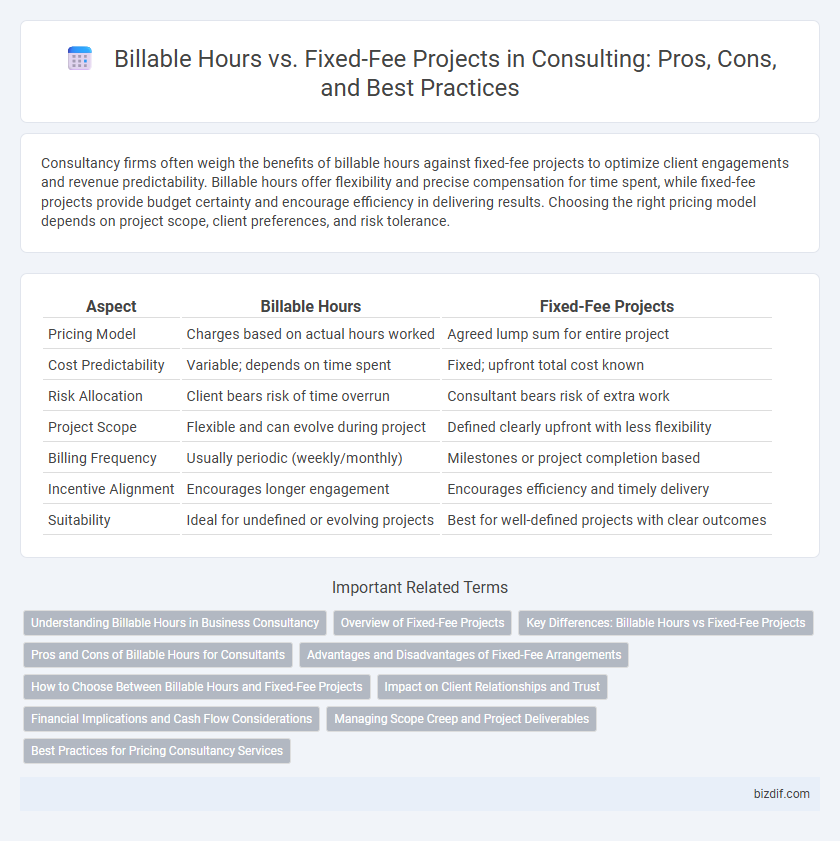Consultancy firms often weigh the benefits of billable hours against fixed-fee projects to optimize client engagements and revenue predictability. Billable hours offer flexibility and precise compensation for time spent, while fixed-fee projects provide budget certainty and encourage efficiency in delivering results. Choosing the right pricing model depends on project scope, client preferences, and risk tolerance.
Table of Comparison
| Aspect | Billable Hours | Fixed-Fee Projects |
|---|---|---|
| Pricing Model | Charges based on actual hours worked | Agreed lump sum for entire project |
| Cost Predictability | Variable; depends on time spent | Fixed; upfront total cost known |
| Risk Allocation | Client bears risk of time overrun | Consultant bears risk of extra work |
| Project Scope | Flexible and can evolve during project | Defined clearly upfront with less flexibility |
| Billing Frequency | Usually periodic (weekly/monthly) | Milestones or project completion based |
| Incentive Alignment | Encourages longer engagement | Encourages efficiency and timely delivery |
| Suitability | Ideal for undefined or evolving projects | Best for well-defined projects with clear outcomes |
Understanding Billable Hours in Business Consultancy
Billable hours in business consultancy refer to the time consultants spend working directly on client projects, which is billed at an agreed hourly rate. Precise tracking of billable hours ensures accurate client invoicing, maintaining profitability and transparency in project management. Efficient management of billable hours enables consultancy firms to optimize resource allocation and forecast revenue more effectively.
Overview of Fixed-Fee Projects
Fixed-fee projects provide a predetermined budget agreed upon by the client and consultancy, ensuring cost predictability and simplified billing. They encourage efficient project management by emphasizing deliverables and timelines rather than hours tracked. This pricing model reduces financial risk for clients and motivates consultancies to optimize resource allocation and productivity.
Key Differences: Billable Hours vs Fixed-Fee Projects
Billable hours require tracking actual time spent on tasks, ensuring clients pay for precise work durations, while fixed-fee projects set a predetermined price regardless of time invested. Billable hours offer flexibility for changing project scopes but can lead to unpredictable costs, whereas fixed-fee projects provide budget certainty, making them ideal for well-defined deliverables. Consultants must evaluate project complexity and client preferences to determine the optimal billing method that balances transparency, risk, and profitability.
Pros and Cons of Billable Hours for Consultants
Billable hours offer consultants flexibility in charging clients based on actual time spent, ensuring precise compensation for services rendered. This model promotes transparency and allows for adjustments if project scope evolves, but it can create uncertainty for clients concerned about escalating costs. Consultants may face challenges managing time efficiency and client expectations, potentially limiting scalability compared to fixed-fee arrangements.
Advantages and Disadvantages of Fixed-Fee Arrangements
Fixed-fee arrangements provide clear cost predictability for clients and reduce administrative burdens associated with tracking billable hours, fostering stronger client trust and streamlined project management. However, fixed-fee projects carry the risk of scope creep and may result in lower profitability if project requirements expand or unforeseen complexities arise. Consultants must carefully assess project scope and potential risks to ensure fixed fees cover all deliverables without compromising quality or financial viability.
How to Choose Between Billable Hours and Fixed-Fee Projects
Choosing between billable hours and fixed-fee projects depends on accurate project scope assessment and risk tolerance. Billable hours offer flexibility for evolving requirements but may lead to client uncertainty over costs, while fixed-fee projects provide predictable budgeting with the risk of underestimating effort. Consultants should evaluate project complexity, client preferences, and experience with similar engagements to align pricing models with value delivery and profitability.
Impact on Client Relationships and Trust
Billable hours can introduce uncertainty for clients, potentially straining trust due to fluctuating costs and perceived lack of transparency. Fixed-fee projects foster clearer expectations and stronger client confidence by providing predictable budgets and outcomes. Prioritizing transparency and consistent communication in either model is crucial for maintaining positive, long-term consultancy relationships.
Financial Implications and Cash Flow Considerations
Billable hours projects generate revenue based on actual time spent, providing flexibility but unpredictable cash flow, which can challenge financial planning and invoicing cycles. Fixed-fee projects offer predictable income streams and simplified budgeting, enabling better cash flow management but carry risks of scope creep and underestimation. Understanding the balance between these models is critical for consultancy firms to optimize profitability and maintain steady financial health.
Managing Scope Creep and Project Deliverables
Managing scope creep in consultancy requires clear definition of project deliverables and strict tracking of billable hours versus fixed-fee agreements. Billable hours provide flexibility to accommodate changes but demand meticulous time logging to prevent budget overruns. Fixed-fee projects necessitate precise scope management and change control processes to avoid unplanned work that can erode profitability.
Best Practices for Pricing Consultancy Services
Optimizing consultancy pricing requires balancing billable hours with fixed-fee projects to maximize profitability and client satisfaction. Implement time tracking software to accurately capture billable hours while setting clear project scopes and deliverables for fixed-fee agreements. Regularly analyze project data to adjust pricing strategies, ensuring competitive rates and value-based billing aligned with client outcomes.
Billable hours vs Fixed-fee projects Infographic

 bizdif.com
bizdif.com